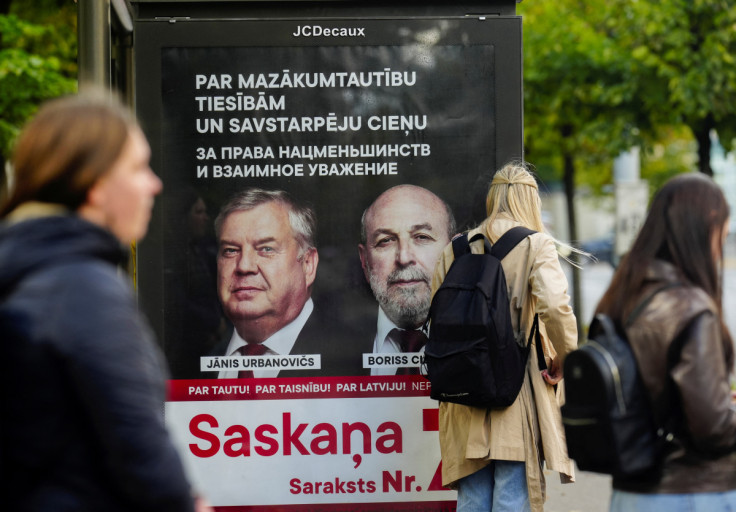As Latvia Goes To Polls, Ethnic Russian Population Fears Losing Identity

Latvia's parliamentary election on Saturday could widen a growing rift between the country's Latvian majority and its Russian-speaking minority over their place in society, amid widespread national anger over former Soviet master Moscow's invasion of Ukraine.
The seven-month war has prompted efforts by Prime Minister Krisjanis Karins' centre-right coalition government to impose limits on the use of the Russian language in public life.
The extent to which these efforts will materialise is at stake in the election, with issues as such soaring energy costs and high inflation pushed largely to the sidelines amid questions of national identity and security concerns.
"What has been the problem for (Russian speakers), for the last 30 years, to learn the state language? If you didn't, you don't want to be a full member of the society", Rihards Kols, deputy head of the conservative National Alliance party, told Reuters this week.
His grouping as well as its coalition partner, Karins' centrist New Unity party, are benefitting from their hawkish approach to Russia in the run-up to the election. Opinion polls show the New Unity party winning the largest number of votes, with around 20% support.
Before Moscow invaded Ukraine on Feb. 24 in what it terms a "special military operation", tens of thousands of Russian speakers in Latvia used to gather every May 9 around a monument in Riga to commemorate the Soviet victory in World War Two.
Their gatherings were banned after the invasion and the 84-metre structure in the centre of the capital was crushed with a bulldozer on orders from the government - which is dominated by ethnic Latvians and which would now prefer to bury the memories of being part of the former Soviet Union up to 1991.
TV broadcasts from Russia, formerly watched by many, have also been banned, the state language board has proposed renaming a central Riga street commemorating Russian poet Alexander Pushkin, and the government has put forward plans to switch all education to Latvian and to swiftly phase out instruction in Russian.
'SOCIETY NEEDS TO RALLY TOGETHER'
Many ethnic Latvians are rallying behind the changes.
But many of Latvia's Russians, who make up about a quarter of the population of 1.9 million, are left feeling they may be losing their place in the society.
"Many Russians do not feel psychological comfort currently here in Latvia", Arnis Kaktins, a sociologist, told Reuters.
The Russian minority grew significantly while Latvia was ruled from Moscow, fueled by settlers.
Ethnic Latvians largely see the country's incorporation into the Soviet Union in 1940 as an illegal annexation, the Soviet victory in 1945 as a renewal of the brutal occupation, and contemporary Russia as a threat.
Russian-speakers tend to believe Latvia joined Soviet Union willingly, and that Russia - at least before the Ukraine war - is a friendly country, Kaktins said.
"Before the Ukrainian war, many of Russian speakers had a very favourable view about President Vladimir Putin. Then the war started, which was a shock to them".
Many ethnic Russians now refuse to speak to pollsters, indicating unease about voicing their views, he said.
Karins said he believes the war in Ukraine consolidated his nation, and said that if re-elected, he would integrate the Russian minority by having the country educate its children in the Latvian language.
"We're putting all of our focus on the youth, to make sure that regardless of what language is spoken at home, that the child grows up with all of the advantages of knowing our language, knowing our culture", Karins told Reuters on Tuesday.
For Jelena Matjakubova, a teacher at a school in Riga and head of Russian Culture Society, sidelining the Russian language and culture will mean deepening tensions between the two ethnic groups.
"At the most critical moment, when the society needs to rally together, they suddenly begin pushing through the most painful issues", she told Reuters.
She said some of her pupils tell her they plan to change their ethnicity to Latvian in official documents, while others want to start a life outside Latvia after school, she said.
Matjakubova said she now speaks only Russian in public, as a protest against perceived disrespect. "If I get a polite response, I switch to Latvian", she said.
© Copyright Thomson Reuters {{Year}}. All rights reserved.





















